
Juggling work-life balance
Maintaining work-life balance can be HARD but with careful planning it
CAN BE DONE!
Tips to make weekends away possible

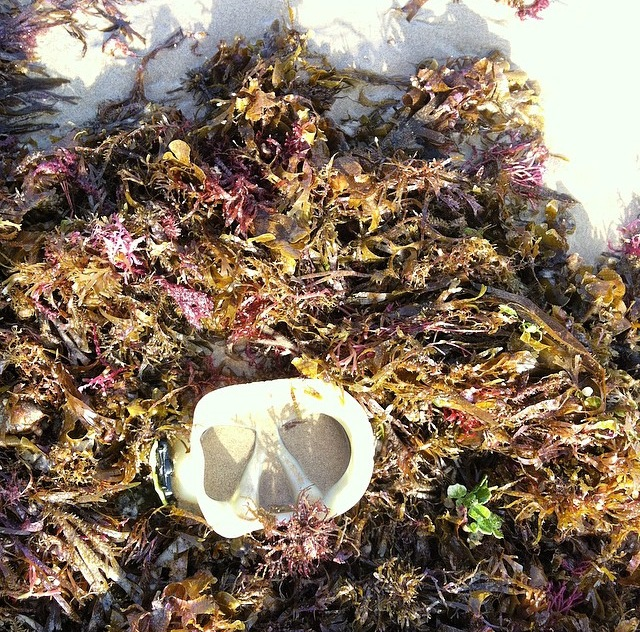
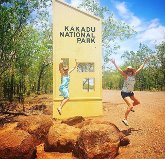

Maintaining work-life balance can be HARD but with careful planning it
CAN BE DONE!




Spring is the season of growth and transformation. We come out of the hibernation of Winter and move forward with bursting flowers, warmer weather and longer days of sunlight. There is a sense of renewal and new life all around.
While Winter was a time to conserve energy and reduce activity, spring is a time of regeneration, new beginnings, and a renewal of spirit.
Spring is the ideal time for cleansing and rejuvenation for overall health and well-being, as well as corresponding to the “Wood” element, which in turn is conceptually related to the liver and gallbladder organs. According to the philosophy of Chinese medicine, the liver is responsible for the smooth flow of energy movement throughout the body. When the liver functions smoothly, physical and emotional activity throughout the body also runs smoothly. We even feel like doing more exercise and being outside!
Imbalances that can occur during Spring:
Feeling frustrated, irritable, anger outbursts
Insomnia, restless sleep
Temporal headaches, migraines
Depression
Abdominal discomfort
Alternating bowel motions
Lack of motivation
A feeling like there is a lump in the throat
Premenstrual symptoms
Irregular, painful periods
Bitter taste in the mouth
Stiff joints
Dry mouth and throat
Ringing in the ears
Sore red eyes, blurry vision
Seasonal acupuncture treatments a minimum four times a year can serve to regulate the inner organ systems and can correct minor annoyances before they become health problems. Acupuncture can help improve the overall health of your liver as well as treat stress, anger and frustration, which are often associated with liver disharmony.
Stretch – The liver controls the tendons. According to Chinese medicine, the liver stores blood during periods of rest and then releases it to the tendons in times of activity, maintaining tendon health and flexibility. Incorporate a morning stretch into your routine. Try a local yoga class!
Eye Exercises – The liver opens into the eyes. Although all the organs have some connection to the health of the eyes, the liver is connected to proper eye function. Remember to take breaks when looking at a computer monitor for extended periods of time and do eye exercises.
Eat Greens – Green is the colour of the liver and of spring time. Eating young plants – fresh, leafy greens, sprouts, and immature cereal grasses – can improve the liver’s overall function.
Taste Sour – Foods and drinks with sour tastes are thought to stimulate the liver’s movement. Put lemon slices in your drinking water, use vinegar and olive oil for your salad dressing. Garnish your sandwich with a slice of dill pickle.
Do more outdoor activities – Outside air helps energy to flow. If you have been feeling irritable or stuck, find an outdoor activity to smooth out that liver stagnation. Try bush walking or take up swimming.
Enjoy milk thistle tea
Milk thistle helps protect liver cells from incoming toxins and encourages the liver to cleanse itself of damaging substances, such as alcohol, medications, pesticides, environmental toxins, and even heavy metals such as mercury.
Take care of you, see you in the clinic,
TK xx
Tanya Keam Wellness is an experienced health clinic on the Sunshine Coast. Helping you to feel better in all aspects of your health and wellbeing.

According to Traditional Chinese Medicine, the body cycles through twelve 2 hour cycles every day and night, during which each organ system becomes most active. So that for each particular organ system it has a high tide, such as 7-9am – Stomach time – why breakfast is so important !
The cycle can be regarded as running from 3am, when Liver time concludes and the body’s energies turn outward; in readying the body for the day by cleansing the lungs and the large intestine for the new day ahead. Then, from 3pm onward, the energies flow back in to restore and maintain the body during rest and sleep.
The organs and their peak functioning times are itemised below.
What does this mean? A example is when a patient is waking between 1 and 3am consistently, we can see that the Liver is showing an imbalance in its ability to function properly. Stress is a common factor that many people experience – demanding jobs, families to support, deadlines, worrying about the future, “living for the future” i.e. superannuation funds need contribution etc. Poor diet, excessive alcohol consumption, suppressing emotions can also create imbalance in the energy of the liver. Our deepest sleep should be at 2am!
Liver symptoms that can occur include headaches, premenstrual symptoms or irregular periods, tension shoulders, fullness in chest/ribs, dream disturbed sleep, quick tempered/irritable, outbursts, depression, moodiness, sighing, lack of motivation, poor day-to-day planning, irritable/irregular bowel movements, fever, red face and eyes.
Talk with your acupuncturist about the symptoms you are experiencing so a treatment can be tailored and the imbalanced corrected – all you have to do is maintain it!
The respiratory tract, lungs and sinuses are cleansed and maintained. Gentle breathing occurs and sleep becomes shallower in preparation for waking. Grief and sadness may be experienced at this time.
The large intestine packs the stool for excretion ideally at 7 am so it is important to allow time for elimination in the early morning. Drinking water and avoiding caffeine during this time helps promote defecation. Guilt and defensiveness may occur at this time.
The peak time of the day for digestion. For this reason TCM advocates having the main meal including protein at breakfast. The emotions of disgust and despair may be experienced at this time.
Said to be the most important digestive organ in TCM, the Spleen directs the processes of digestion, transforming foods and liquid into energy and blood. The spleen also supports the immune system so allergies may be most pronounced at this time. This time window is good for thinking and working, although jealousy, worry and low self-esteem may also be experienced.
Palpitations may be noticed during this time and the majority of heart attacks are said to occur during the late morning. This is not a time to place the heart under additional stress by exercising or being exposed to excessive heat. A good time for meeting, talking and eating, although joy and sadness may also occur.
The small intestine is busy digesting lunch and this may be the time when symptoms such as indigestion, abdominal pain and bloating may occur. This time window is good for sorting and organising, although insecurity, vulnerability and abandonment may also be experienced.
The bladder is associated with the skin and skin irritations and eczema may be noticed during this time. Many people may feel tired and want a nap mid-afternoon and a salty snack such as a bowl of miso soup will strengthen this organ. Good for storing and reserving, although this time may be associated with timidity.
Tiredness may carry over from bladder time if the adrenals (endocrine glands produce a wide variety of hormones) are depleted (also governed by the kidneys). However, if the adrenals are strong, there may be a second wind of energy. Good for driving and consolidating, although fear and terror may reach a peak.
The pericardium (a sac surrounding the heart) governs the master glands and reproductive organs. If depleted, low back pain may result arising from the kidneys. Good for socialising, flirting and sexual energy. Negative aspects include being unresponsive and unable to express emotions, feeling hurt, or extremes of joy.
The triple warmer (temp balance) governs the endocrine system and the blood vessels. Headaches or feeling tired and weak during this time may indicate significant arterial repair taking place. Good for relaxing, although may be associated with feelings of hopelessness, confusion, and paranoia.
The gallbladder is associated with regeneration and sleep which is why we are told that the hours before midnight are important! If restless during this time, this indicates that the gallbladder and liver are overwhelmed and the toxins remaining in circulation are acting as an irritant to the brain. Emotions associated with this time window include bitterness, resentment or indecisiveness.
The liver gets down to the work of processing the day’s nutrients and detoxifying the day’s toxin load. Deep resting and dreaming also occurs during this time and it is the worst time to eat as the small intestine is at its lowest ebb. Anger, frustration, rage reach a peak and waking at this time can often lead to overthinking things, writing lists of what needs doing for the day ahead and also difficulty falling back to sleep. The liver is about organisation! If this is your consistent waking time – start carrying a diary with you – write lists and get your organisation happening throughout the day and before bed time.
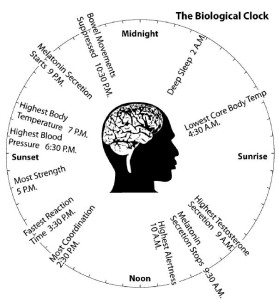
Acupuncture will treat the organs with an imbalance such as waking at 4am or fatigue at 11am for example – Talk with your acupuncturist about the symptoms you are experiencing so a treatment can be tailored and the imbalanced corrected – all you have to do is maintain it! It might be small nutritional changes, stress management ideas tailored to you.
Understanding that every organ has a repair/maintenance schedule to keep on a daily basis offers you the opportunity to learn how to treat yourself for improved health and well-being. It also allows you to identify exactly which organ system or emotion needs strengthening/resolving. Always use your symptoms and body cues as a guide, and if you make a connection above, such as that you get sleepy between 5-7pm, don’t hesitate to research what you can do to strengthen that organ (which would be the Kidneys). A great solution to deficient kidneys is having a sweet potato for breakfast!
Make sure to look at the emotional aspect too. If you’re sleepy during kidney time, do you have any fears holding you back from reaching your true potential? Are you afraid of rejection? Failure? Addressing this emotion will strengthening the organ and improve your physical health now and for the future 🙂
Take care of you, see you in the clinic,
TK xx
Tanya Keam Wellness is an experienced health clinic on the Sunshine Coast. Helping you to feel better in all aspects of your health and wellbeing.

Chinese medicine gives us numerous mental, physical and nutritional tools to help us maintain balance all year round. There is much focus around the seasons of the year, where each of our organs are associated with each season. Winter is of the Kidneys and Bladder which rule water metabolism and maintaining homeostasis, a dynamic continual rebalancing. Winter is also the most ‘yin’ time of the year – yin is dark, cold, slow, with inward energy, compared to Summer which is light, hot, quick, with expansive qualities.
Some people feel quite energised by Winter, going snowboarding and being out in the chilly weather bush walking. While others retract, stay inside and can feel low in mood from the lack of light and physical activity.
Imbalances that can occur during the winter months include:
Foods that are beneficial during the Winter months include:
Root vegetables, winter greens, mushroom, apple, pear, potato, squash, citrus fruits, kidney bean, black sesame seed, dark leafy greens, chicken, lamb, tempeh, whole grains, miso, unrefined sea salt, bone broths (organic).
Chinese medicine dietetic philosophy suggests that we embrace native foods, locally grown, and organic and/or chemical free where possible. Take time to sit down and enjoy your meal.
Tips to stay well this Winter:
Exercise wise, we all do less during the cooler months as it is a time to rest and revitalise our kidneys, which is why some animals hibernate. Nature is at rest, and in this rest replenishes itself.
By eating well, regular exercise, paying attention to our bodies and harmonising ourselves to the seasons, we can stay healthier and prevent illness. Once we feel good and are maintaining a level of wellness that we all strive for, it allows us to enjoy the cooler months, whether its indoors or hitting the waves (with a wetsuit!). Thus, Winter is the perfect time to look inward, reflect on ourselves, practice writing or other practices such as yoga, pilates or tai chi.
Take care of you, see you in the clinic,
TK xx
Tanya Keam Wellness is an experienced health clinic on the Sunshine Coast. Helping you to feel better in all aspects of your health and wellbeing.
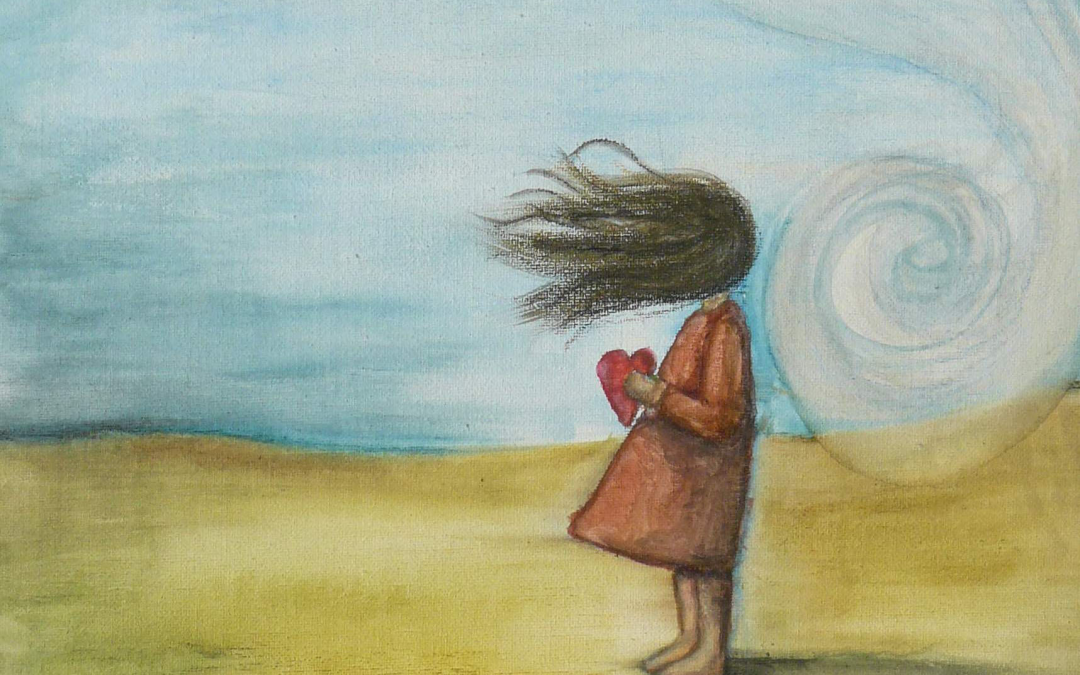
Autumn is the season that follows the long and hot days of summer, where the days become shorter, the nights a little cooler, presenting us with earthy coloured falling leaves to prepare for the coming winter. With the change in temperature, especially the summer humidity that we experience in Queensland Australia, the air signals us to start putting away the summer frocks and get out warmer jackets and scarfs. We also begin to harvest and gather brightly coloured foods of the new season, such as pumpkin and squash.
Chinese medicine is very much focussed around the seasons of the year. We go from the relaxed and carefree attitudes of Summer to the more serious and introspective energies of Autumn. In Autumn we move from the external, expansive nature of Summer to the internal, contracting nature of Autumn. It is a good idea to finish up projects you’ve started in spring and summer and frolic in the rewards, a bit like the planting of seedlings in the veggie patch that have been harvested.
In Chinese medicine, Autumn is associated with the lungs and colon. The energy of the lungs are colon are about “letting go”, in all aspects of our life so that we can make room for new experiences that will help us to learn and grow.
Dry skin, lips and throat
Stiff upper back and neck
Allergies, allergic rhinitis and sinusitis
Weak immunity
Sneezing and running rose
Lack of vitality
Itching
Dry or phlegmy cough
Constipation
Asthma
Skin conditions flare up, such as eczema
Sitting with sadness/grief for longer
Practice breathing exercises
Let go of negativity in your life
Walk outside
Reorganise, clean and declutter
Recognise sadness/grief
Brush your skin with a dry soft brush
Acupuncture and cupping are helpful to prevent illness (colds and flu that are common in autumn) and to assist your body to recover quickly
Wear a scarf and jacket to protect your neck and back from the wind
Garlic, Sweet potato, Ginger, Onion, Cabbage, Rice, Cinnamon, Cardamon, Leek, Miso, Navy beans, Almonds, Asparagus, Walnuts, Pear, Olives, Cauliflower, Yoghurt, Apples, Celery, Broccoli, Apricot, Sourdough, Sauerkraut, Cloves, Squash, Pumpkin
The best way to stay well according to Chinese medicine, is to learn about the nature of each season and to live in harmony with its spirit. If we are living in harmony with the world around us, the Autumn around us, we see that nature is a powerful system of slowing down and contracting, preparing to rest, so its good for us to mimic this. Sleeping a little longer, eating less cold foods and instead more warming and nourishing foods, like stews and soups, and paying extra attention to our internal lives. The time of the lungs and colon is about self worth, to give ourselves some extra attention and self love.
Perhaps that yoga class you’ve been meaning to get to for months can now fit into your schedule.
To breathe
To nurture
To let go.
Take care of you, see you in the clinic,
TK xx
Learn more > http://www.tanyakeamwellness.com

Gut flora (microbiota) is the name given today to the microbe population living in our intestines. It contains tens of trillions of micro-organisms, including at least 1000 different species of known bacteria with more than 3 million genes (150 times more than human genes). Microbiota can, in total, weigh up to 2 kg. One third of our gut microbiota is common to most people, while two thirds are specific to each one of us. In other words, the microbiota in your intestine is like an individual identity card.
While each of us has a unique microbiota, it always fulfils the same physiological functions and they have a direct impact on our health:
•It helps the body to digest certain foods that the stomach and small intestine have not been able to digest.
•It helps with the production of some vitamins (B and K).
•It helps us combat aggressions from other microorganisms, maintaining the wholeness of the intestinal mucosa.
•It plays an important role in the immune system, performing a barrier effect.
•A healthy and balanced gut microbiota is key to ensuring proper digestive functioning.
pH stands for power of hydrogen, which is a measurement of the hydrogen ion concentration in the body. The total pH scale ranges from 1 to 14, with 7 considered to be neutral. A pH less than 7 is said to be acidic and solutions with a pH greater than 7 are basic or alkaline.
When we eat acid-forming foods, our body works to bring our blood pH back into balance by releasing alkaline-rich minerals into our bloodstream (e.g. calcium, phosphorus and magnesium).
If we are not eating enough alkaline-forming foods, then our body has to pull these minerals from our bones, teeth and organs. This can compromise our immune system, cause fatigue and make us vulnerable to viruses and disease.
Maintaining an approximate 80% alkalinity and 20% acidity diet is the best way to maintain wellness.
Acidic foods (alcohol, refined sugars, coffee, fast foods, chocolate, red meat, fish, dairy) are foods that are associated with disease. A highly acidic diet creates a favourable environment for yeast, fungus, abnormal cells and even parasites to multiply and grow.
Alkaline foods (most fruit and vegetables such as leafy greens, lemons, citrus fruits, berries, broccoli, cabbage, nuts, herbal tea) are foods which maintain and prevent disease from occurring in the body.
Even the word “parasite” sounds terrible. Like a villain, living off the goodness within you! Eeek!
Parasites infect the gastro-intestinal tract of humans and other animals. They can live throughout the body, but most prefer the intestinal wall. Means of exposure include: ingestion of undercooked meat, drinking infected water, and skin absorption.
Antibiotics are advised for intestinal parasites from your GP. However there are other options and/or in combination:
Firstly, the 4 R’s:
1. Remove the micro-organisms that shouldn’t be there, as well as toxic foods (acidic) you shouldn’t be eating
2. Replace/restore the nutrients, bacteria, intestinal flora (pre and probiotics)
3. Repair the cell on every level
4. Relaxation! – Stress, anxiety etc
Remove – Many qualified health practitioners can sort a digestive cleanse for you, using anti-microbials which first rid the body of the unwanted organisms. This can be a long haul as the organism will continue to reproduce.
Including colonics – a colon enema cleanse which literally involves flushing the colon with water and herbs.
Removing foods that have inflammatory properties will aid the whole process – wheat, gluten, soy, dairy, sugar, alcohol, fructose.
Replace/restore – In addition to the above digestive cleanse, probiotics are taken at the same time to restore the yummy gut flora. Probiotics can be taken in tablet form, yoghurt, kombucha (a fermented herbal tea – see my how to make kombucha post) or fermented vegetables. I would recommend all of the above, except for dairy during the cleanse.
Maintaining a diet that is 80% alkaline will create an unhappy environment for the parasites as they enjoy the acidity.
Repair – Additional supplements and herbs can be prescribed for you which will improve your overall health, aside from probiotics etc. Such as immune support which is a common imbalance to get parasites, worms etc in the first place. Seeking treatment from a qualified practitioner such as Chinese medicine would be ideal.
Relax – A key rule in life, not just for intestinal upsets. Regular exercise, sleeping well, good emotional-mental health, breathing deeply etc.
Intestinal parasites can be missed in stool samples, so ask your doctor for 2 or 3 samples to do a week a part just in case.
Following up with stool tests 3 and 6 months after being diagnosed is ideal. They will most certainly want to survive in you!
You may think “oh gosh it will be such a long process to rid these parasites” … but your whole digestive system will have improved and I will guarantee you will learn more about your health, diet and lifestyle in the process !!
Take care of you, see you in the clinic,
TK xx
Learn more > http://www.tanyakeamwellness.com
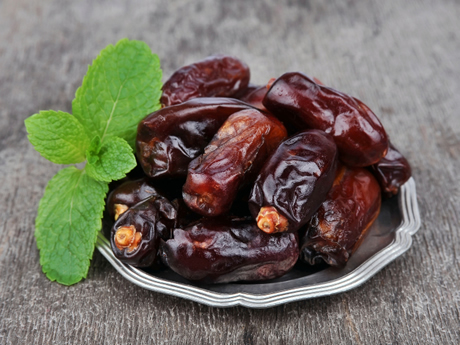
Is a diagnostic term we use in Traditional Chinese medicine (TCM) for someone who is showing signs and symptoms of inadequate nourishment of the blood within the body. It is not uncommon for women to present with this type of deficiency as women lose blood in every menstrual cycle, however men can also present with it.
Many of the symptoms (below) are similar to iron deficiency anaemia, however the concept of blood in TCM refers more to the quality of the blood in its entirety to nourish the body as a whole. Whereas, anaemia in a Western term relates to deficiencies of folic acid, B12, protein building blocks and other nutrients. It may be beneficial to share with your TCM practitioner if you are aware that you are iron deficient so that dietary changes can be made.
Low energy
Blurry vision
Light headedness
Poor memory
Dry eyes, skin and hair
Pale complexion, lips, tongue colour, nails and inside the eyelid
Difficulty falling asleep
Hair loss or premature greying
Women – light or absent periods, migraines/headaches at specific times in the cycle
Tremors, numbness, tics
Weak nails
Anxiety or other mood fluctuations
We first look at where the deficiency is coming from:
1. A diet which is lacking in the appropriate nutrients
2. Poor digestive function (the ability to absorb nutrients)
3. Excessive bleeding (often menstrual but also due to trauma or following surgery)
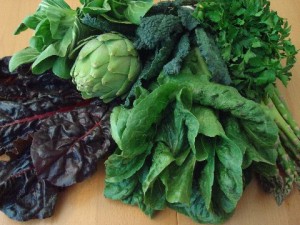
| Grains | Barley, corn, oats, rice, sweet rice, wheat, bran |
| Vegetables | Alfalfa sprout, artichoke, beetroot, button mushroom, cabbage, celery, dandelion leaf, dark leafy greens, kelp, shiitake mushroom, spinach, watercress, wheatgrass |
| Fruit | Apple, apricot, avocado, date, fig, grape, longan, mulberry |
| Beans/legumes | Aduki, black soya, kidney, chickpea, red lentils |
| Nuts, seeds | Almonds, black sesame |
| Fish | Mussel, octopus, oyster, sardine, tuna |
| Meat | All red meat especially bone marrow and liver (beef, pork, sheep). Bone broths are particular helpful |
| Dairy | Chicken egg, |
| Herbs, spices | Nettle, parsley |
| Oils, condiments | Amasake, molasses |
| Beverages | Soya milk |
| Common supplements | Algae, pollen |

| Vegetables | artichoke, beetroot, dandelion leaf, kelp |
| Fruit | avocado, date, mulberry, grape |
| Nuts /seeds | black sesame |
| Fish | oyster |
| Meats | beef, liver (both pork and sheep) |
| Herbs/ spices | nettle |
| Oils/ condiments | molasse |
You may be consuming the correct foods, however if your digestive function is depleted than the nutrients are being passed through your stools instead of being transported to the cells around your body. This is where acupuncture comes in!
Acupuncture alone cannot nourish the blood, but it can greatly improve on the digestive function, like giving your body a 10-20% boost in what your digestive function should be doing, thus increasing the absorption of nutrients from food.
There is also great importance on the way that foods are cooked. To support your digestive system, lightly cooking (steaming, blanching, soups, stews) and consuming warm foods is ideal. Add in some spices to aid digestion such as ginger, cumin, fennel and cardamom.
To support your system further (on top of acupuncture treatments and dietary changes) and to nourish the blood more efficiently, a herbal formula may be developed for your individual situation. Supplements may include iron, vitamin B12, folic acid and to enhance iron absorption vitamin C (lemon juice) may be also taken with foods such as leafy greens.
Take care of you, see you in the clinic,
TK xx
Learn more > http://www.tanyakeamwellness.com
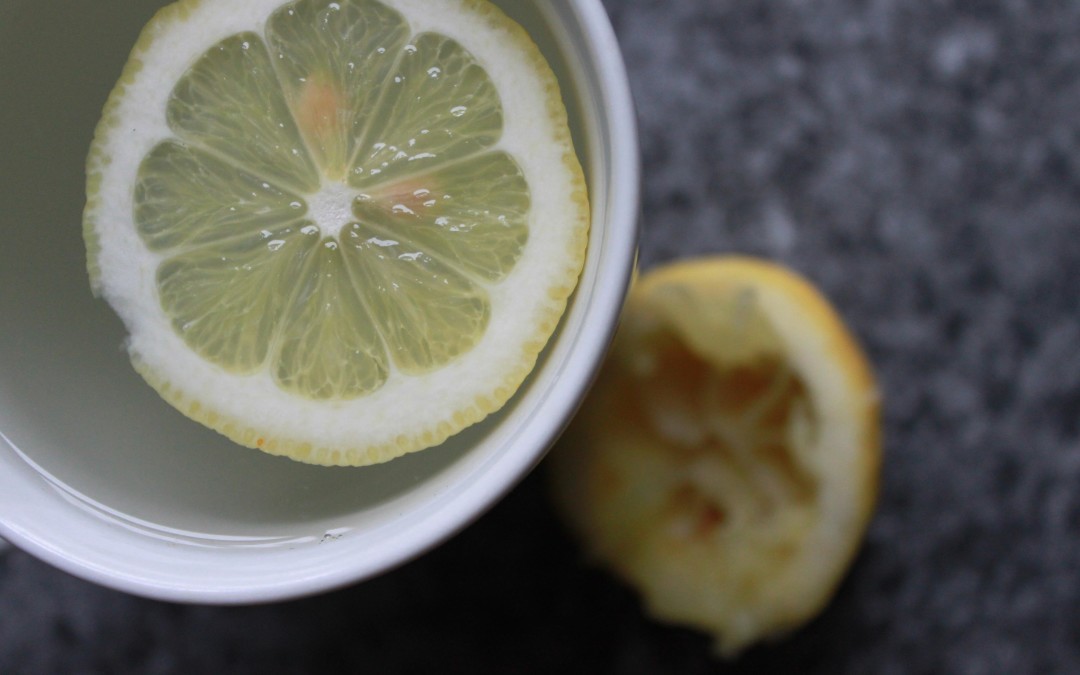
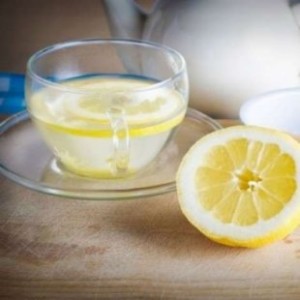
Foods are associated with certain specific properties according to their taste. The five flavours TCM recognizes are: sour, sweet, bitter, pungent and salty. These are also linked to the four natures, being temperatures: cold, cool, warm and hot. TCM uses the flavours of food to coincide with the seasons. For example: In winter we enjoy more warm – hot meals to warm us up, and in Summer we enjoy more cool – cold foods to cool us down.
It is thought that lemons originated in China (along with India, Burma and other parts of southeast Asia) so it’s no surprize that the lemon also forms a part of a healthy diet according to Traditional Chinese Medicine (or TCM).
Hot lemon water first thing in the morning is ideal for the liver to get things moving for the day ahead, both energetically, as well as to hydrate the body after 8 hours of sleep, and to stimulate bile to assist the digestive system in breaking down food.
Juice a whole heap of lemons in one go and freeze the juice into ice cubes so that they are ready to go each morning
Diluting the juice and brushing your teeth after drinking is advised to prevent tooth enamel decay.
Take care of you, see you in the clinic,
TK xx
Learn more > http://www.tanyakeamwellness.com